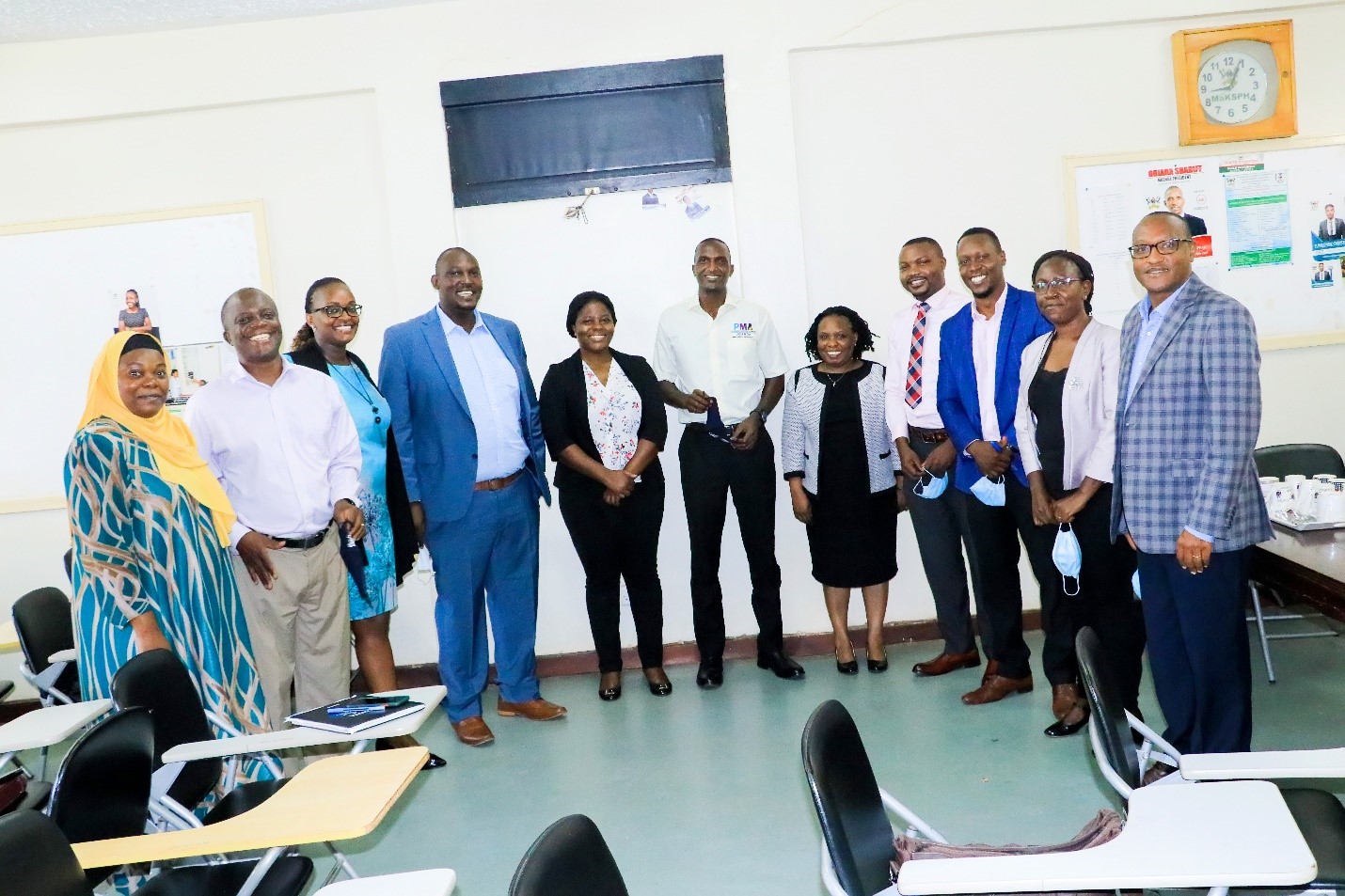
Members and Heads of Units at MakSPH in a group photo with a team from Jhpiego after sharing results of the 2nd OCA in February 2021. Photo by Davidson Ndyabahika
Makerere University School of Public Health has scored highly during the 2nd Organizational Capacity Assessment (OCA), conducted by Jhpiego, an international, non-profit health organization and an affiliate of The Johns Hopkins University.
As per the Jhpiego Organizational Capacity (JOC) toolkit, organizations implementing projects globally undergo thorough capacity assessment in areas of Leadership and Governance, Finance and Administration, Human Resources, Project Management, and Data Visualization and Communications.
This particular capacity assessment was according to Pascal Olinga, the Performance Monitoring Action -PMA Program Manager at Jhpiego Uganda supposed to take place in July in 2020 but was postponed due to COVID -19 to early this year. The first assessment was conducted in 2019 July.
Initially, the School had scored 60% under leadership and governance but the second assessment has put MakSPH at 80%, signifying a steady improvement. Under this category, an assessment is conducted in some over-arching areas such as organizational registration, board, leaders and succession plans, fundraising as well as resource mobilization.
Just like in OCA1, MakSPH’s Finance and Administration scores are very high at 98%, a contributing factor in attracting new funding. The second assessment established that the School’s procurement and Financial Management policies and systems are strong and that their semi-autonomous status has helped to streamline processes with high rates of donor compliance.
“We found out that submission of accountability for advances is now timely as a result of constant follow-up and sensitization. Electronic filing of documents is now in place. Staff are planning their procurement better thus improved turnaround time since government processes can be lengthy,” Douglas Mwendwa, the head of Finance and Administration at Jhpiego Kenya.
Mr. Mwendwa highlighted the need to advocate for internal operational Information Technology guidelines within the overall University IT Policy to cater for evolving needs Staff Sensitization required for IT backup.
On human resources, the School scored 100% according to the assessment while the PMA project management scored 88% with recommendations to establish a platform for sharing best practices across projects as well as encourage projects to share lessons learnt, best practices for knowledge management. This was in addition to modifying/adopting the University asset management policy and regularly update it.
Miriam Tharao, a Senior Human Resources Management & Development Manager, Jhpiego Kenya lobbied the School to initiate a Performance Improvement Planning (PIP) process that is separate from the annual appraisal and probationary review for human resources. This was in addition to ensuring visibility of Fraud and Whistleblower Policies posters in every office wing and meeting room as a way of encouraging transparency.
Mr. Olinga equally observed that the new MakSPH Communications Strategy, Stakeholder Engagement plan among other documents have greatly improved scores in the communications domain which the OCA also focused on. It scored 80% up from 40% at the previous assessment.
Mr. Olinga, says once they identify gaps in these areas of assessment, they support the institution in building their capacity to become more effective and efficient.
Dr. Frederick Makumbi, associate professor and Deputy Dean MakSPH who also doubles as the PMA Uganda project’s Principal Investigator assured the team that the project was to continue engaging other projects to learn and implement best practices.
“The School of Public Health is a star in Makerere University in many things. And I think what makes us a star is partly the strength which comes with supporting the School not only in research but also capacity building,” said Prof. Makumbi.
Representing the Dean, Dr. Christine Nalwadda, the Head of Department for Community Health and Behavioral Sciences -CHBS said she was extremely proud of the improvements, thanks to the efforts by the dedicated staff.
“Thank you for visiting us and thank you for being good visitors; telling us who we are and where we should improve. If you do not have such assessments, then you cannot improve. This is the only opportunity when you can learn from where you are and how you can improve. You mention that most of the areas we had weaknesses in the last assessment have been improved. We want to thank you and the entire team at the School for making us shine,” Dr. Nalwadda said.
She added that; “We are going to continue engaging the higher offices to ensure that the areas that you have outlined are worked on. This information is very important and I am sure we shall have an opportunity to share this good news with our management and Board and staff members.”
PMA is a project fueling a data revolution to guide family planning programs. The program is implemented by local universities and research organizations in 11 countries in both Africa and Asia. In Uganda, Makerere University School of Public Health is the Implementing Partner for PMA. It is funded by the Bill and Melinda Gates Foundation with Johns Hopkins Gates Institute (Technical Unit) and Jhpiego (Program Management Unit) as project partners.
Written by Davidson Ndyabahika

